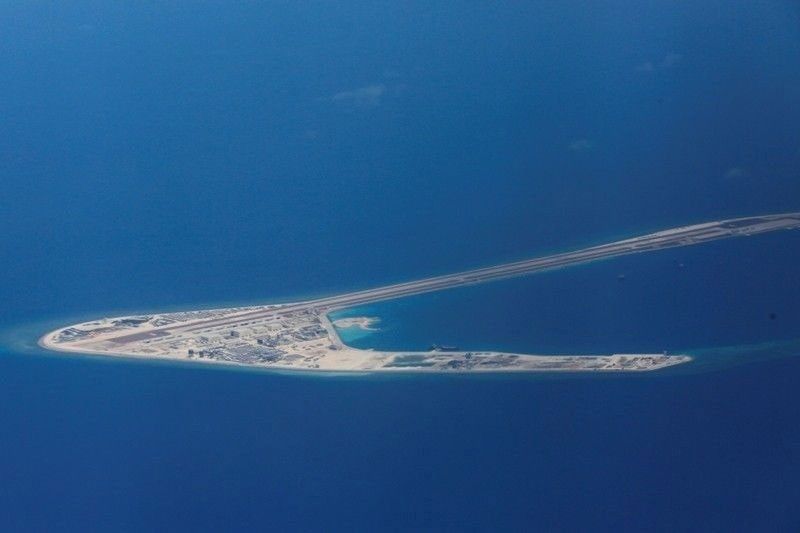Palace hits ‘hardline’ critics on West Philippine Sea

MANILA, Philippines — Malacañang yesterday accused retired Supreme Court justice Antonio Carpio and former foreign secretary Albert del Rosario of pushing for “hardline all-or-nothing” policies on the West Philippine Sea that are “dangerous and inconsistent with international law.”
During his public address on Wednesday, President Duterte chided Carpio and Del Rosario over their constant criticism of his handling of the maritime row, saying the Philippines lost territories in the West Philippine Sea during their watch.
The President also expressed doubt that any member of the United Nations would go to war for the Philippines even if the country had won the case it filed against China before an international arbitral tribunal.
Carpio responded by saying that the Duterte administration “very quickly shelved” the ruling that favored the Philippines to secure Chinese investments.
“Filipinos deserve, and should demand, a President who loves Filipinos first and foremost and who would uncompromisingly defend Philippine sovereignty and sovereign rights in the West Philippine Sea,” the retired magistrate added.
Del Rosario, for his part, called on Duterte to “do his utmost to protect the West Philippine Sea and to be most wary of China’s duplicity.”
He explained the loss of the Panatag (Scarborough) Shoal in 2012, saying China “deceitfully breached” a US-brokered agreement that Manila and Beijing would withdraw their ships from the area.
The word war over the maritime dispute is not yet over as Malacañang hurled fresh tirades at Carpio and Del Rosario yesterday, accusing them of issuing “illegal, impractical and irresponsible statements.”
In a statement, presidential spokesman Harry Roque claimed that the two former officials were “wrong based on the law and the facts.”
“The outbursts of Justice Carpio and Secretary del Rosario are not helping our country. They demand that the President adopt hardline all-or-nothing policies. However, history shows that countries that demand all or nothing policies often get nothing at all, or even end up provoking war,” Roque said.
“This is exactly what the President is avoiding. Because all or nothing policies are not only inconsistent with international law and international reality they are dangerous and they will not work,” he added.
‘Why hit Pinoys rather than China?’
Yesterday, Del Rosario sought an explanation from the government on why it is defending and giving more importance to China over the Philippines and the Filipino people despite Beijing’s seizure of the country’s territorial waters and continued illegal presence in the West Philippine Sea.
Executive Secretary Salvador Medialdea had also criticized Del Rosario and Carpio for putting the blame on President Duterte for China’s aggressive stance in the disputed WPS.
In an open letter to Medialdea, Del Rosario responded to the allegations on the challenges surrounding the WPS.
“China has been taking away our land and waters. We would like to ask, Mr. Secretary, why our fellow Filipinos are being chastised for wanting to defend our country, rather than China? Why are we giving more importance to China over that of our own people?” Del Rosario asked.
Del Rosario said Duterte is being counted upon to resolve China’s seizure of Philippine territorial waters and its continued illegal presence in the WPS because it is his “constitutional duty” as President and he is “relied upon” to defend its territory.
China is strongly asserting that it has indisputable sovereignty over the South China Sea as represented by the nine-dash line.
“On why is the President being counted upon to lead in resolving challenges to sovereignty, it is because this is what presidents must be relied upon to do. To defend what is ours is also found in our Constitution,” Del Rosario said.
During the presidency of Benigno Aquino III, Del Rosario said the Philippine government filed an arbitration case in The Hague, resulting in an overwhelming victory.
However, he said that “shortly after the successful outcome which included the invalidation of the nine-dash line, it was decided by our government to shelve the case for fear of displeasing Beijing.”
He also responded to why the arbitral tribunal victory is being depicted as one of significance to a small minority of countries only, noting that for the record, nearly all responsible nations have recognized that the arbitral outcome is now an integral part of international law.
These nations include the United States, Japan, Australia, France, Germany, European Union, Canada and the United Kingdom.
“We trust that their support is being consolidated,” he added.
The Palace has been saying that there is no possibility that the arbitral outcome can be enforced.
But Del Rosario stressed there are various ways to enforce the outcome, one of which is to submit it before the United Nations General Assembly to “compel” China to abide by the rule of law.
The former top diplomat noted that there are several precedents in which a small country has won over a larger country in the UN General Assembly. – Pia Lee-Brago
- Latest
- Trending
































